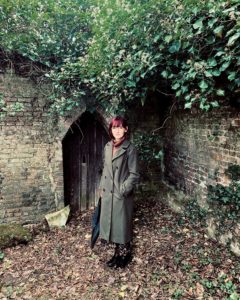We Herts Folklorists 2
Here is our second post for a special weekly blog series we’ll be running over the next few weeks, showcasing some of the wonderful talent of people who have recently completed the MA in Folklore Studies at the University of Hertfordshire. Throughout this series you will see some great folklore-inspired work, ranging from blogs to art.
 This week, Jaymie Tapsell!
This week, Jaymie Tapsell!
Coming from a traditionally working-class background, I am the first in my family to receive both a BA and an MA degree. Since I was a child, my mum has been very vocal of her folkloric beliefs e.g., things happening in three’s, touching wood so as not to tempt fate, or interpreting positive and negative omens when she sees them. Folklore has always been ‘normal’ to me, so when I came to write my dissertation as a mature undergraduate History student at Goldsmiths in 2019, I immediately looked at how to incorporate traditions, customs, and beliefs into my research. I finally settled on a project entitled ‘In Search of Merrie England: The Relationship Between Folklore and the Dress & Identity of the Poor in Nineteenth-Century England’. Whilst I was completing my BA I made the decision to pursue an MA and, as luck (or fate) would have it, the University of Hertfordshire were launching their brand new MA in Folklore Studies in September of that very year. Whilst enrolled on the Folklore Studies MA, I was able to strengthen my interests, whilst also being introduced to new topics that I had not considered before. You will see from my blogs that I decided to pursue a variety of topics including the migration of customs and traditions amongst the Irish diaspora, the folklore of my local landscape along the Essex Thames estuary, and contemporary customs in the time of COVID-19 and national lockdown. All of the modules offered were extremely interesting and inspiring, with full unwavering support given by the brilliant module tutors. My dissertation, which was kindly supervised by Prof. Owen Davies, ultimately focused on the interactions between politics, identity, and folklore in contemporary England, which I hope to continue forward at PhD level at some point in the future. For now, I will be pursuing independent research projects related to my areas of interest, including an upcoming project that will focus on the folklore of illegal raves, as well as a collaborative zine that will feature the folklore of South East Essex with my friend and folklore colleague Claire Slack.